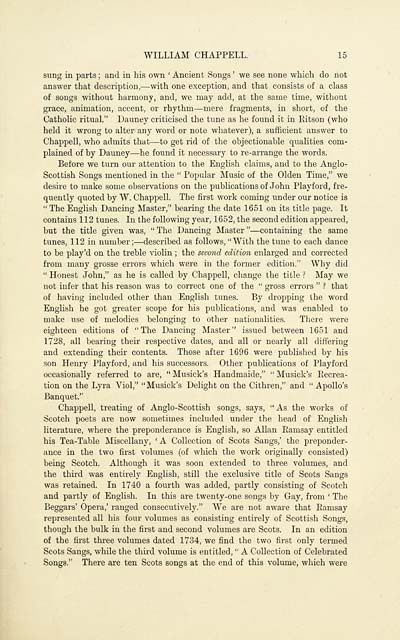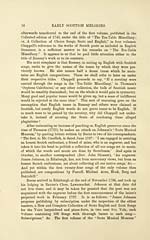Inglis Collection of printed music > Printed text > Early Scottish melodies
(37) Page 15
Download files
Complete book:
Individual page:
Thumbnail gallery: Grid view | List view

WILLIAM CHAPPELL. 15
sung in parts ; and in his own ' Ancient Songs ' we see none which do not
answer that description, — with one exception, and that consists of a class
of songs without harmony, and, we may add, at the same time, without
grace, animation, accent, or rhythm — mere fragments, in short, of the
Catholic ritual." Dauney criticised the tune as he found it in Eitson (who
held it wrong to alter any word or note whatever), a sufficient answer to
Chappell, who admits that — to get rid of the objectionable qualities com-
plained of by Dauney — he found it necessary to re-arrange the words.
Before we turn our attention to the English claims, and to the Anglo-
Scottish Songs mentioned in the " Popular Music of the Olden Time," we
desire to make some observations on the publications of John Playf ord, fre-
quently quoted by W. Chappell. The first work coming under our notice is
" The English Dancing Master," bearing the date 1651 on its title page. It
contains 112 tunes. In the following year, 1652, the second edition appeared,
but the title given was, " The Dancing Master " — containing the same
tunes, 112 in number; — described as follows, "With the tune to each dance
to be play'd on the treble violin ; the second edition enlarged and corrected
from many grosse errors which were in the former edition." Why did
" Honest John," as he is called by Chappell, change the title ? May we
not infer that his reason was to correct one of the " gross errors " ? that
of having included other than English tunes. By dropping the word
English he got greater scope for his publications, and was enabled to
make use of melodies belonging to other nationalities. There were
eighteen editions of "The Dancing Master" issued between 1651 and
1728, all bearing their respective dates, and all or nearly all differing
and extending their contents. Those after 1696 were published by his
son Henry Playford, and his successors. Other publications of Playford
occasionally referred to are, " Musick's Handmaide," " Musick's Eecrea-
tion on the Lyra Viol," "Musick's Delight on the Cithren," and " Apollo's
Banquet."
Chappell, treating of Anglo-Scottish songs, says, "As the works of
Scotch poets are now sometimes included under the head of English
literature, where the preponderance is English, so Allan Ramsay entitled
his Tea-Table Miscellany, 'A Collection of Scots Sangs,' the preponder-
ance in the two first volumes (of which the work originally consisted)
being Scotch. Although it was soon extended to three volumes, and
the third was entirely English, still the exclusive title of Scots Sangs
was retained. In 1740 a fourth was added, partly consisting of Scotch
and partly of English. In this are twenty-one songs by Gay, from ' The
Beggars' Opera,' ranged consecutively." We are not aware that Ramsay
represented all his four volumes as consisting entirely of Scottish Songs,
though the bulk in the first and second volumes are Scots. In an edition
of the first three volumes dated 1734, we find the two first only termed
Scots Sangs, while the third volume is entitled, " A Collection of Celebrated
Songs." There are ten Scots songs at the end of this volume, which were
sung in parts ; and in his own ' Ancient Songs ' we see none which do not
answer that description, — with one exception, and that consists of a class
of songs without harmony, and, we may add, at the same time, without
grace, animation, accent, or rhythm — mere fragments, in short, of the
Catholic ritual." Dauney criticised the tune as he found it in Eitson (who
held it wrong to alter any word or note whatever), a sufficient answer to
Chappell, who admits that — to get rid of the objectionable qualities com-
plained of by Dauney — he found it necessary to re-arrange the words.
Before we turn our attention to the English claims, and to the Anglo-
Scottish Songs mentioned in the " Popular Music of the Olden Time," we
desire to make some observations on the publications of John Playf ord, fre-
quently quoted by W. Chappell. The first work coming under our notice is
" The English Dancing Master," bearing the date 1651 on its title page. It
contains 112 tunes. In the following year, 1652, the second edition appeared,
but the title given was, " The Dancing Master " — containing the same
tunes, 112 in number; — described as follows, "With the tune to each dance
to be play'd on the treble violin ; the second edition enlarged and corrected
from many grosse errors which were in the former edition." Why did
" Honest John," as he is called by Chappell, change the title ? May we
not infer that his reason was to correct one of the " gross errors " ? that
of having included other than English tunes. By dropping the word
English he got greater scope for his publications, and was enabled to
make use of melodies belonging to other nationalities. There were
eighteen editions of "The Dancing Master" issued between 1651 and
1728, all bearing their respective dates, and all or nearly all differing
and extending their contents. Those after 1696 were published by his
son Henry Playford, and his successors. Other publications of Playford
occasionally referred to are, " Musick's Handmaide," " Musick's Eecrea-
tion on the Lyra Viol," "Musick's Delight on the Cithren," and " Apollo's
Banquet."
Chappell, treating of Anglo-Scottish songs, says, "As the works of
Scotch poets are now sometimes included under the head of English
literature, where the preponderance is English, so Allan Ramsay entitled
his Tea-Table Miscellany, 'A Collection of Scots Sangs,' the preponder-
ance in the two first volumes (of which the work originally consisted)
being Scotch. Although it was soon extended to three volumes, and
the third was entirely English, still the exclusive title of Scots Sangs
was retained. In 1740 a fourth was added, partly consisting of Scotch
and partly of English. In this are twenty-one songs by Gay, from ' The
Beggars' Opera,' ranged consecutively." We are not aware that Ramsay
represented all his four volumes as consisting entirely of Scottish Songs,
though the bulk in the first and second volumes are Scots. In an edition
of the first three volumes dated 1734, we find the two first only termed
Scots Sangs, while the third volume is entitled, " A Collection of Celebrated
Songs." There are ten Scots songs at the end of this volume, which were
Set display mode to: Large image | Transcription
Images and transcriptions on this page, including medium image downloads, may be used under the Creative Commons Attribution 4.0 International Licence unless otherwise stated. ![]()
| Special collections of printed music > Inglis Collection of printed music > Printed text > Early Scottish melodies > (37) Page 15 |
|---|
| Permanent URL | https://digital.nls.uk/94643716 |
|---|
| Description | Scottish and English songs, military music and keyboard music of the 18th and 19th centuries. These items are from the collection of Alexander Wood Inglis of Glencorse (1854 to 1929). Also includes a few manuscripts, some treatises and other books on the subject. |
|---|
| Description | The Glen Collection and the Inglis Collection represent mainly 18th and 19th century Scottish music, including Scottish songs. The collections of Berlioz and Verdi collected by bibliographer Cecil Hopkinson contain contemporary and later editions of the works of the two composers Berlioz and Verdi. |
|---|
![[Page 14]](https://deriv.nls.uk/dcn4/9464/94643706.4.jpg)
